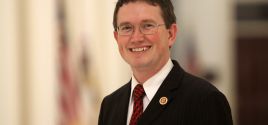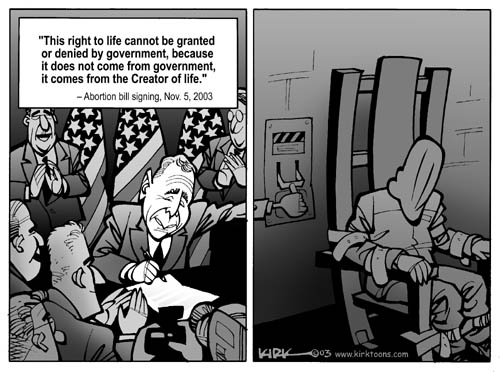After Executing 150 People, Bush Names This Sunday 'Sanctity of Life' DayInformationLiberationJan. 21, 2007 |
Popular 
Rep. Thomas Massie Warns Congress is Trying to Pass Hate Speech Laws to Outlaw Criticism of Israel

ADL Urged Congress to Pass FISA Law Spying on Americans to 'Protect Israel'

'Sniper Seen on Roof Overlooking Pro-Palestine Protest' at Indiana University

Axios Poll: Majority of Americans Now Want Mass Deportations

Claim Jewish Student Was 'Stabbed In The Eye' by Pro-Palestine Protester Draws Mockery After Video Released
 From VOA News: President Bush has declared this Sunday to be "National Sanctity of Human Life Day." His designation comes before the annual protest in Washington Monday of the Supreme Court's 1973 decision legalizing abortion. Mr. Bush, who opposes abortion, said his proclamation is a reminder that all human life must be valued - "not just those considered healthy, wanted or convenient." The proclamation also alludes to stem cell research. Mr. Bush said the right policies can allow science to help alleviate human suffering without sanctioning the violation of the dignity of human life. Mr. Bush strongly disagreed with congressional efforts last year to expand stem cell research. For the only time, he used his presidential veto power to stop such research going forward. The proclamation on the sanctity of human life makes no mention of the death penalty. While serving as Texas governor, Mr. Bush oversaw the execution of 150 prisoners.  FLASHBACK: Bush mocks born-again execution victim The National Review In the week before [Karla Faye Tucker's] execution, Bush says, Bianca Jagger and a number of other protesters came to Austin to demand clemency for Tucker. "Did you meet with any of them?" I ask. Bush whips around and stares at me. "No, I didn't meet with any of them," he snaps, as though I've just asked the dumbest, most offensive question ever posed. "I didn't meet with Larry King either when he came down for it. I watched his interview with [Tucker], though. He asked her real difficult questions, like 'What would you say to Governor Bush?' " "What was her answer?" I wonder. "Please," Bush whimpers, his lips pursed in mock desperation, "don't kill me." This charming little vignette comes from Tucker Carlson's profile of George W. Bush in the premiere issue of Talk. Carlson's attitude toward Bush is clearly positive. But the profile is nonetheless devastating, because Carlson is a good reporter who's captured his subject's unattractive aspects as well as his appealing ones. Carlson's major theme is that Bush is "comfortable with himself" and "doesn't give a damn what you think of him." (Message: I don't care.) He has risen above the obsession with what other people think that marks most politicians. Yet the Bush who emerges from the profile is remarkably thin-skinned. Carlson notes that while "the Larry King–Karla Faye Tucker exchange Bush recounted never took place" on television, "Tucker did imply that Bush was succumbing to election-year pressure from pro-death penalty voters. Apparently Bush never forgot it. He has a long memory for slights." If this is what Bush considers payback, remind us to stay on his compassionate side. For sheer ugliness, nothing else in the article matches Bush's remarks on the death penalty. (When he sees Carlson's horrified reaction, Bush "immediately stops smirking": " 'It's tough stuff,' Bush says, suddenly somber, 'but my job is to enforce the law.'") But the section other Republicans in the race are likely to seize on comes when Carlson asks "whether the number of abortions has gone up or down since he's been governor. 'I don't know,' he shrugs. . . . 'Probably down. Not because of anything we've done, though. We haven't passed any laws.'" Where Carlson sees a refreshing reluctance to exaggerate accomplishments, others -- including a lot of pro-lifers who have been giving Bush the benefit of the doubt -- are likely to see a breezy indifference to what Bush says he considers to be the taking of innocent human life. (The abortion rate in Texas, incidentally, has declined slightly since 1994.) Apart from specific gaffes, conservative readers may conclude that Bush just doesn't seem presidential -- at least by pre-Clinton standards. He swears, a lot, in public. He cries. In response to a question after a speech, Bush mentions that he was not a virgin when he got married. How different is this from Clinton's having answered the boxers-or-briefs question, for which he's been pounded for years? Bush, according to Carlson, "believes that his connection to his softer emotional side is part of the key to political success." But in this profile, his flippant, vulgar, and arrogant side is more visible. No wonder Bush's aides are trying to undercut the story. Says spokesman Scott McClellan, "In some areas it reflected the governor's personality and in others we felt the writer misread the governor." As for Karla Faye Tucker's execution, "Anyone who knows the governor knows that it was a very emotional and agonizing decision he took very seriously." He's not saying Bush was misquoted. |



